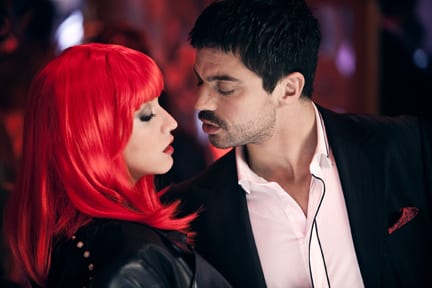 The most frightening villains are not the ones who are imagined, nor the ones who are merely real, but the ones in which it frightens us that they actually existed. One of these people is Uday Hussein, the most infamous of Saddam's two sons. Here is a man so frighteningly sadistic that even the man who is hired (or should I say, forced) to be his double can't do it.
The most frightening villains are not the ones who are imagined, nor the ones who are merely real, but the ones in which it frightens us that they actually existed. One of these people is Uday Hussein, the most infamous of Saddam's two sons. Here is a man so frighteningly sadistic that even the man who is hired (or should I say, forced) to be his double can't do it. "The Devil's Double" is the true story of the man who would be Hussein's body double, Latif Yahia (Dominic Cooper), and how he eventually escaped with one of Uday's women (Ludivine Sagnier). Yahia went to the same privileged school as Uday (Dominic Cooper, again), and the two were deemed lookalikes by their classmates. After Uday threatens to harm Latif's family, Latif reluctantly accepts Uday's offer. It is not the promise of getting everything he wants, but rather the need to save his family, that brings him into this dangerous world. This is the first hint that "The Devil's Double" is not quite the Iraqi "Scarface" that the television spots make it out to be.
Latif realizes from the moment he is told about the job that being Uday's double would require him to "extinguish himself." This is easier said than done, because of the magnitude of change Latif would have to go to in order to transform himself into Uday. Latif is a selfless man from modest means who nearly died for his country. Uday has enough money for a collection of diamond-studded gold watches.
Uday spends his time rounding up as many women as possible, some of age and some not. He lusts, and never desires, any of these women. Collecting women seems less a need to fulfill sexual desire and more a need to show off his power. This comes to light during a horrifying bit when he steals the bride a friend of his had just married.

In a challenging bit that requires him to play two very different people, Cooper steals the show. Then again, there really isn't anyone to steal the show from. He really steals it from himself. He portrays two very different people not just through the modulation of his voice. He is able to channel both good and evil through his eyes. When looking at Latiff, it is as if an angel exists through his pupils. Uday's eyes convey someone who is constantly disgruntled and never satisfied with anything besides himself. There is an endless fire burning in his eyes.
"The Devil's Double" never really bothers to explain or justify Uday's insane antics. There is a lot to explain, but nothing to justify. As the movie shows, and since we are in the world of film that means what the movie shows is absolute truth, Uday lived a sheltered life. Since his father was Saddam, whatever he want, he got. He could get away with murder, literally.

There are many movies that use a decent person's perspective in order to portray the mind and madness of a psychotic ruler. "The Last King of Scotland" did this most effectively. The problem in "The Devil's Double" is that Latif's story is interesting, but his character is not. Cooper as Uday totally overpowers Cooper as Latif.
"The Devil's Double" never has a dull moment. It provides an enthralling story from the beginning and never slows down the endless adrenaline that flows through it. Maybe it runs on too much adrenaline, and it tries too hard to make its subject matter mainstream. In this day and age, casting no Iraqis and not allowing the characters to speak in their native tongue. Most of the actors are British and contrary to prior belief, British people and people from Muslim countries are not similar. However, it is a step up from the brown faces that mark the fatal flaw of "Lawrence of Arabia."
Scenes such as the one where Uday cuts open a man's stomach, and his organs and his organs are exposed rather graphically, lack clear vision and rely on the weakness of showing everything in order to shock. The beginning, which is devoid of dialogue, intertwined with real footage, and somewhat ambiguous (is that Uday? Or Latif?) is a completely different movie. Uday's strange relationship with his mother is briefly alluded to, but never brought into fruition. The thoughts that Uday either learned his habits from his father, or was continually trying to anger him, come to mind throughout.
These problems undermine the flashes of brilliance throughout. The scene in which Saddam confronts his son over one of his worst offenses is chilling because of what could have happened.
The film's weak ending, which comes a few minutes too soon, is a reminder that this is no probe of history but rather an escape action film. It eventually becomes a noteworthy film for its powerful central performance and the uncannily privileged world it brings the audience into. If ever there was a category for this film, "The Devil's Double" would be called pop history.

No comments:
Post a Comment